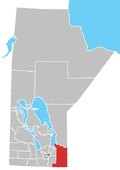Lac Du Bonnet, Manitoba
History
The lake after which Lac du Bonnet takes its name was named by the French explorer and fur trader Pierre Gaultier La Verendrye, c. 1732. The shape of the lake, itself part of the Winnipeg River, is said to have reminded him of a bonnet. The name "Lac du Bonnet" appears on a map of the explorer Joseph Derouen as early as 1760.
Beginning in 1926, Lac du Bonnet was home to the #1 Wing of the Royal Canadian Air Force. As a backup communication system to wireless telephone transmitters, aircraft carried pigeons aboard, and as such a pigeon rookery was established on the air force base. RCAF operations in Lac du Bonnet continued until 1937.
Demographics
In the 2021 Census of Population conducted by Statistics Canada, Lac du Bonnet had a population of 1,064 living in 496 of its 549 total private dwellings, a change of −2.3% from its 2016 population of 1,089. With a land area of 2.26 km (0.87 sq mi), it had a population density of 470.8/km (1,219.4/sq mi) in 2021.
Attractions and events
On the first of July is a yearly Canada Day parade, with fireworks, carnival rides, car show, and bingo. There are also usually many other community-hosted events.
In November, Christmas-themed lighting is set up on the streets, kids can visit Santa, and a Christmas tree is erected.
There are designated snowmobile trails into Lac du Bonnet and specific areas for snowmobile operators to park, along with 5 warming shelters. All of the trail maintenance is done by volunteer organizations.
During the weekend in early March, the river is dotted with one thousand holes for the local ice fishing derby.
The annual Fire & Water Music Festival takes place on August-long weekend. Artists from across the country come to perform their music.
First airmail flight
Lac du Bonnet was the location of the first airmail flight in Manitoba, on 4 October 1927. This event is commemorated with a plaque and marker on the E side of Park Avenue by 3rd Street, next to the parking lot. According to the plaque, the flight was some 85lbs of mail, taken from here to Bissett and Wadhope.

Media
Newspapers
- Lac du Bonnet Leader, which published its final issue on June 27, 2013
- Winnipeg River Echo
- Winnipeg River Clipper Weekly
Radio and television
CBWT-2 first went on the air on May 27, 1968. In early 1969 the province-wide microwave system replaced the kine recordings and citizens of Lac Du Bonnet have had live television since then.
References
- ^ "Census Profile, 2021 Census of Population". August 12, 2022. Retrieved August 19, 2022.
- ^ Max Finkelstein. Canoeing a Continent: On the Trail of Alexander Mackenzie. Natural Heritage/Natural History, 1984
- ^ "Lac du Bonnet Area – Lac du Bonnet Municipal Heritage Advisory Committee (MHAC)".
- ^ "Heritage Sites – Lac du Bonnet Municipal Heritage Advisory Committee (MHAC)".
- ^ "Population and dwelling counts: Canada, provinces and territories, and census subdivisions (municipalities), Manitoba". Statistics Canada. February 9, 2022. Retrieved February 20, 2022.
- ^ Lac Du Bonnet Tourism. "Lions Canada Day Weekend Celebrations". Lac du Bonnet Tourism. Retrieved 2023-08-20.
- ^ "Historic Sites of Manitoba: First Airmail Flight in Manitoba (Lac du Bonnet)". Manitoba Historical Society. Retrieved November 25, 2021.
- ^ Paul, Alexandra (June 26, 2013). "Lac du Bonnet, Beausejour papers to cease publication". Winnipeg Free Press. Retrieved July 4, 2013.
- ^ "Final Edition: Lac du Bonnet Leader ceases publication". Lac du Bonnet Leader. June 27, 2013. Retrieved July 4, 2013.
- ^ "Microwave Hook-Up Gives North Live TV". Winnipeg Free Press. April 29, 1969. p. 28.
